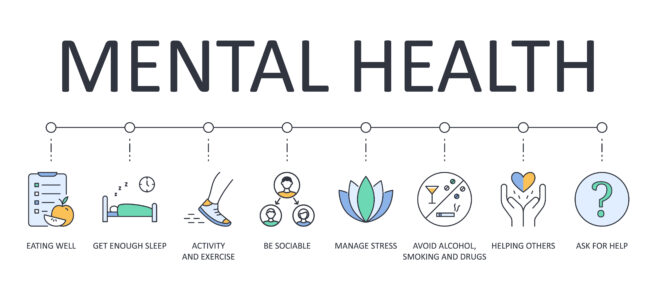Genetics is a field of study that focuses on the scientific exploration of how heredity affects a living organism, including human beings. Genetics studies genes, which are the set of instructions to create the body’s building blocks called proteins.
Genes are made of deoxyribonucleic acid or more commonly known as DNA. They directly influence people’s characteristics and even the likelihood of developing mental health disorders and diseases.
So, how does genetics exactly work, and how does it impact mental health and diseases?
4 Ways Genetics Impact Mental Health And Diseases
People obtain genes from their parents. Genes can be loosely defined as determiners of passed-on traits and characteristics from a person’s parents. Because of them, it’s not surprising why children look, talk, think, or act like their parents. It’s more surprising for children to have no similar qualities with their biological parents.
And often, the current or potential health problems of parents can be passed on to their children. For example, if the parents have certain mental disorders, their children will have a high chance of suffering from those disorders as well.
In this article, you’ll learn the different ways genetics can impact mental health and diseases.
-
Genetic Mutation
Genetic mutation makes species diverse. Mutations refer to changes in the organism’s genetic sequence. These mutations often make children a bit different from their parents. These genetic changes happen at varying levels and bring different consequences.
It’s important to know how genetic mutations affect mental health and disease development, such as methylenetetrahydrofolate reductase or MTHFR mutations. But what are MTHFR gene mutations?
MTHFR is needed to convert folic acid into l-methylfolate, an active and usable enzyme by the body, which plays a vital role in producing neurotransmitters like dopamine, serotonin, and norepinephrine. These neurotransmitters help regulate mood. However, some people with MTHFR mutations are limited to convert dietary folate and folic acid into l-methylfolate.
Just like with any genes, mutated genes can also be inherited. At conception, an individual receives one MTHFR gene copy from each parent. So, if both parents have mutations, the offspring has a high risk of developing a homozygous mutation, which may lead to serious health problems.
It’s important to undergo an MTHFR test to determine if you have an MTHFR mutation. Healthcare providers can use this information to determine what treatments you can or can’t receive if you’re ill, especially if you have depression.
In a trusted source, the following conditions have been associated with MTHFR genetic mutation:
- Cardiovascular and blood diseases (such as blood clots, embolism, heart attack, and stroke)
- Anxiety
- Migraines
- Depression
- Bipolar disorder
- Nerve pain
- Schizophrenia
- Colon cancer
- Acute leukemia
- Recurrent miscarriages
- Pregnancy anomalies (such as anencephaly, spina bifida, and other neural tube defects)
-
Genetic Aberrations
Chromosomal or genetic aberrations usually result from cell division problems or mitosis errors. Cells duplicate chromosomes in mitosis, producing daughter cells with the same number of chromosomes as the parent or original cell. Chromosome aberrations may include gains and losses in chromosome number, as well as changes in structure. Researchers observe chromosome structures under a standard light microscope to study aberration types.
Chromosomal abnormalities commonly affect babies, causing birth defects. A normal fertilized egg contains 23 chromosomes from each parent, which make up 23 pairs of chromosomes. Girls have XX chromosomes and XY for boys. However, chromosomal abnormalities happen when there’s an extra chromosome or when a part of a chromosome is duplicated or deleted.
Some examples of common chromosomal abnormalities in children include Down syndrome, Klinefelter syndrome, Trisomy 13, Trisomy 18, XYY syndrome, triple X syndrome, and Turner syndrome. Patients with these chromosomal aberrations usually have social and cognitive problems and other mental health issues. Chromosomal abnormalities also drastically affect a child’s development and growth.
Prenatal testing is crucial in ruling out chromosomal abnormalities. Some of the invasive diagnostic techniques for chromosomal abnormalities include the following:
- Amniocentesis: This procedure is done starting at 15 weeks of gestation or pregnancy.
- Chorionic villus sampling (CVS): This diagnostic procedure is done in the first trimester or 10 to 13 weeks of gestation.
- Noninvasive Prenatal Testing (NIPT): This procedure is also called cell-free DNA screening, which is a blood test to check DNA from the placenta found in the blood of the mother. This screens common chromosome abnormalities, like trisomy 18 and Down syndrome in high-risk pregnancies.
-
Genetics Research And Development
The role of research and development in genetics exploration is big. Scientists and researchers make use of state-of-the-art equipment and devices to determine how genes mutate and work when exposed to various elements.
Genetics research study the essential roles of genes in disease development and traits. It helps find out the cause of medical conditions and identify possible targets for medical or therapeutic intervention. With genetics research and development, healthcare professionals gain valuable insights as to the best treatment options available for a patient.
Almost every disease has a genetic component, in which the genetic contribution can be small or large. Researchers study every disease to determine how genetic factors contribute to its pathological development.
After all, people inherit their genes from their parents. Genes tell our bodies how to develop and function. A person’s DNA code may have alterations such as having extra or missing pieces, contributing to health issues. Hence, genetics research is crucial in healthcare.
Here are some ongoing genetics research and reviews that are focused on helping the healthcare industry:
- Pathogenic Germ Cell Nuclear Acidic Peptidase (GCNA) variations linked with male infertility
- Adaptive approach to integrate genomics into healthcare system
- Genome-wide association study
- DNA damage repair and cell survival promoted in the blood shortly after death
- Mapping gene and pathways linked with cardiovascular disease
-
Genetics Linkage
With genetics research, the genetic linkage between mental and physical health is continuously being studied by different research agencies and companies. Clinical trials and studies help determine the role of genetics in the development of depression, schizophrenia, anxiety problems, and even coping mechanisms.
Scientists recognize that psychiatric disorders run in families, which suggests potential genetic roots. Some examples of psychiatric disorders with possible genetic roots include attention deficit hyperactivity disorder (ADHD), autism, bipolar disorder, schizophrenia, and major depression.
A research analysis revealed genetic variations associated with these five psychiatric disorders, particularly in two genes (CACNA1C and CACNB2) that code calcium flow into nerve cells or neurons.
Conclusion
Genetics can impact a person’s mental and physical health because genes have innate traits passed on from the parents to their offspring. By studying genetics, you increase your genetics awareness, which may help you understand and discover the potential physiological or mental health challenges you may face in the future.




